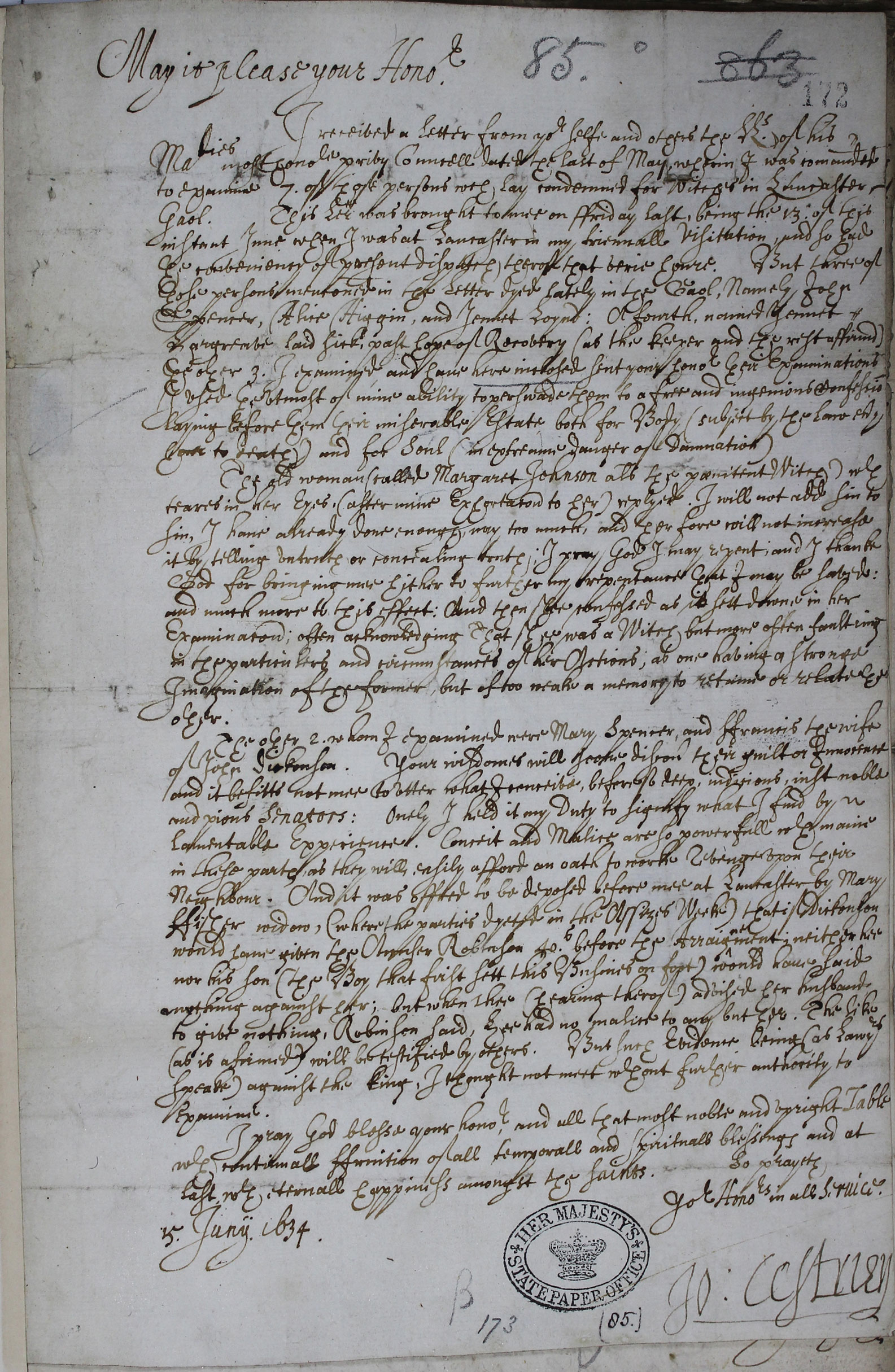
The Lancaster Witches: letter of Bishop of Chester. (Catalogue ref: SP 16/269 f. 172)
This is the letter that accompanied the examinations carried out by the Bishop of Chester when he sent them on to the Privy Council. It was common for a senior church figure to carry out such examinations of people accused of witchcraft,15 June, 1634.
Transcript
- My it please your honour
- I received a letter from yourself and others the Lords of his
- Majesties most honourable privy council [closest advisers] dated the last of May wherein I was commanded
- to examine 7 of those persons which lay condemned for witches in Lancaster
- This letter was brought to me on Friday last, being the 13 of this
- instant June when I was at Lancaster in triennial visitation [regular church inspection] and so had
- the convenience of present dispatch [letter] thereof that very hour. But thereof
- those persons mentioned in the letter died lately in the Gaol, namely John
- Spencer, Alice Higgin and Jennet Loyd. A fourth named Jennet
- Hargrave laid sick, past hope of recovery (as the keeper and the rest affirmed).
- The other 3 I examined and have here enclosed sent your honour their examinations
- I used the utmost of my ability to persuade them to a free confession
- laying before them their miserable estate both for body (subject by the law
- to death) and for soul (in extreme danger of damnation)
- The old woman (called Margaret Johnson also the penitent witch) with
- tears in her eyes (after my exhortations to her) replied: “I will not add sin to
- I have already done enough nay too much and therefore will not increase
- it by telling untruth or concealing truth. I pray God I may repent and I thank
- God for bringing me here to further my repentance that I may be saved.”
- And much more to this effect. And then she confessed as is set down in her
- examinations, often acknowledging that she was a witch but more often faulting
- in the particulars and circumstances of her actions, as one having a strange
- imagination of the former, but of too weak a memory to retain or relate the
- other.
- The other 2 whom I examined were Mary Spencer and Francis the wife
- of John Dickenson. Your wisdoms will soon discover their guilt or innocence
- and it befits not me to utter what I conceive, before so deep, indecisions, just noble
- and pious senators. Only I hold it my duty to signify what I find by
- lamentable [regrettable] experience. Conceit and malice are so powerful with many
- in these part as they will easily afford an oath to work revenge upon their
- And it was offered to be deposed before me at Lancaster by Mary
- Fisher widow (where the parties were in the Assizes Week) that if Dickenson
- would have given the accuser Robinson 40s [shillings] before the Arraignment [formal reading of criminal charge] neither he
- nor his son (the boy that first set this business on foot) would have said
- anything against her, but when she (hearing thereof) advised her husband
- to give nothing, Robinson said he had no malice to any but her. The like
- (as is affirmed) will be testified by others. But such evidence being (as lawyers
- speak) against the King [when somebody admits guilt and then acts as a witness in a trial], I thought not meet without further authority to
- examine.
- I pray God bless your honour and all that most noble and upright Table
- with continual fruition of all temporal and spiritual blessings and at
- last with eternal happiness amongst the saints
